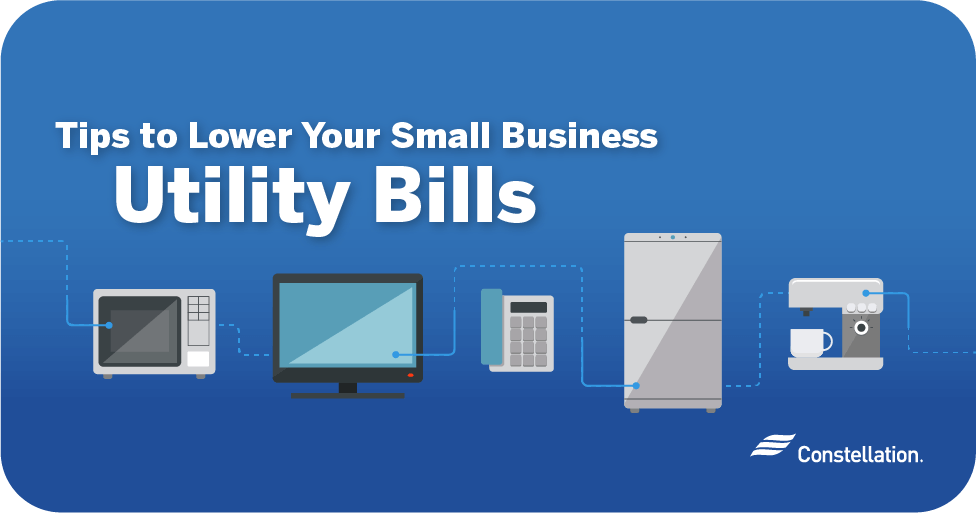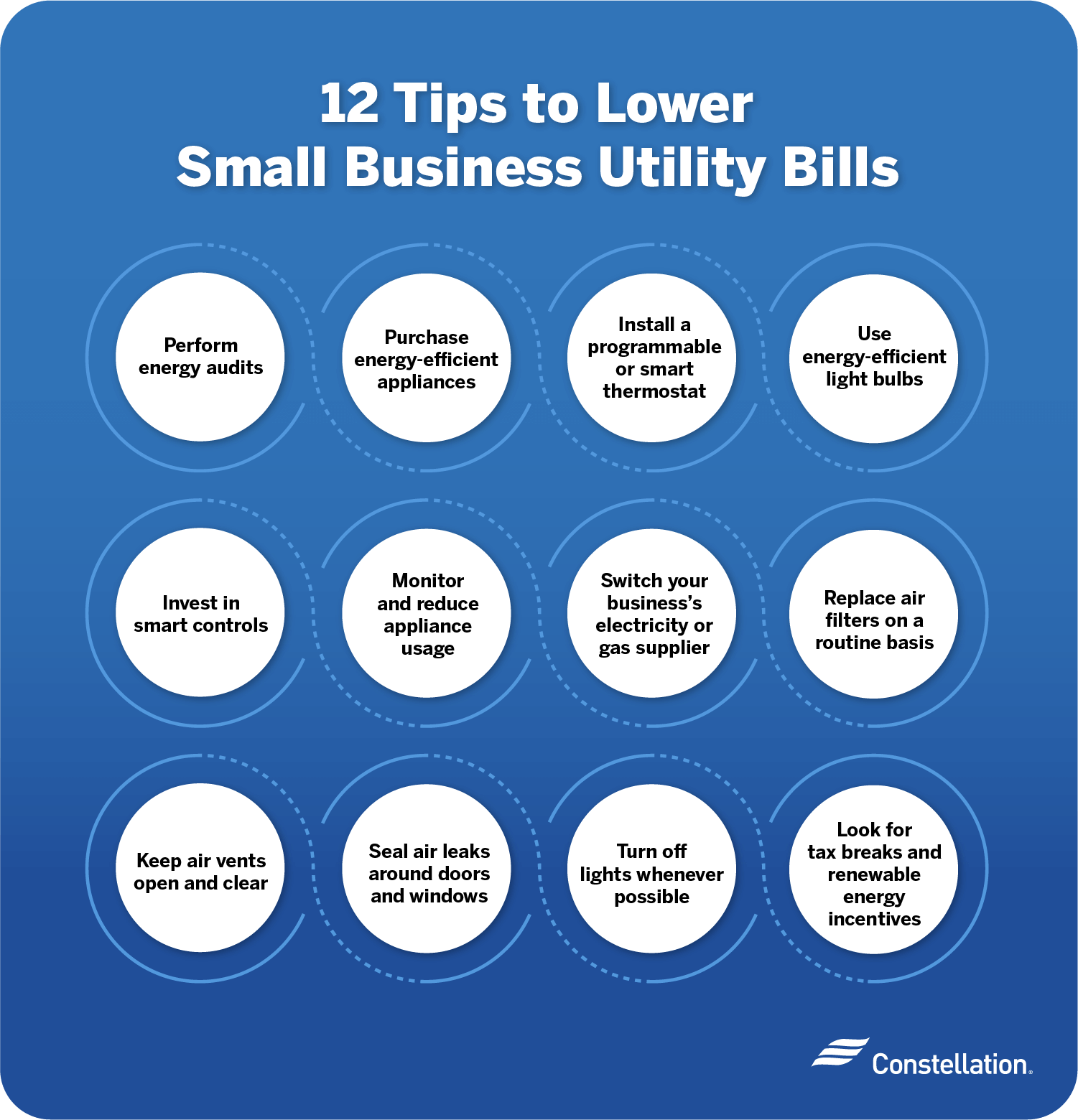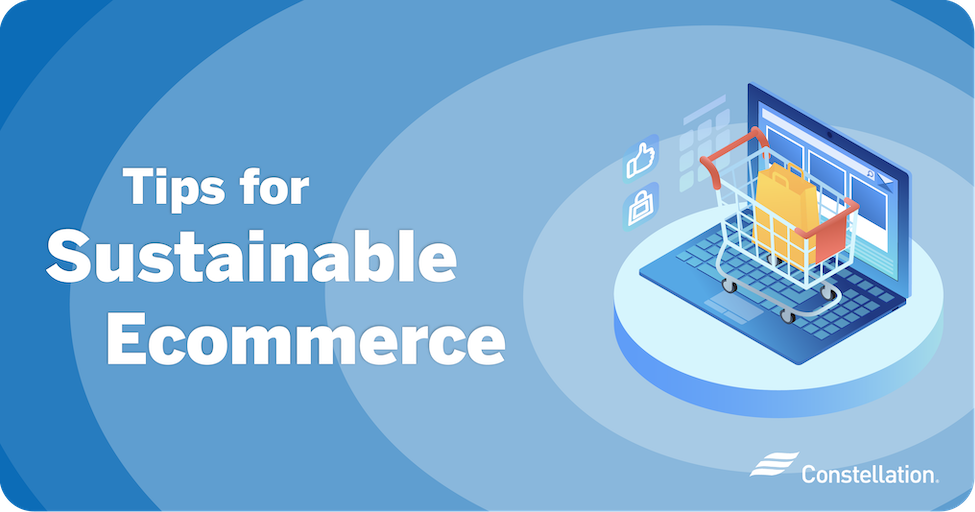
- Category:
Small Business Energy Savings -
Last updated:
May 18, 2022
Tips to Lower Your Small Business Utility Bills
It’s important to have tips to lower your small business utility bills, especially as competition and cost pressures are on the rise. Many managers pay little attention to the “hidden” cost of paying for utilities. Putting a small focus on how to lower utility bills will save you money and likely impact the overall efficiency of your operations.
What makes up your business’s utility bill?
When thinking of types of utility expenses for your business, you could be talking about water, internet, trash, cable, phone, gas, and, often the largest: The electric bill. They are part of the basic infrastructure costs of running your business.
Different types of utility expenses for businesses
Controlling these expenses is how you can start to save money on utilities for your small business. You can check out how to estimate utility costs and then look for ways to trim.
- Electric or gas. In deregulated markets, your energy supplier may be a different entity from your energy producer. Having a choice of retail energy suppliers vs utility providers means you can shop around for the best prices, contracts and terms.
- Trash and recycling. You can contract privately for waste removal and rent a dumpster. If you have a relatively small volume of waste, however, you might get a better deal from your municipality.
- Internet, telephone and cable. Prices for connectivity vary widely across the various technologies and providers. It pays to shop around.
12 tips to lower small business utility bills

These tips to lower utility bills focus on one of your largest utility expenses: Electricity. When you are looking at how to lower utility bills, cutting this larger expense can make a difference to your bottom line. You can cut your small business energy consumption for greater overall efficiency.
1. Perform energy audits
Performing an energy audit for your small businesses is the best place to start. You might know what a home energy audit is. Energy audits for businesses are similar. A professional assessment will give you details on how you are using energy in your business, identify where energy might be wasted, and recommend places where usage can be cut and optimized.
2. Purchase energy-efficient appliances
Advances in energy-efficient appliances have been remarkable, even in the last five to seven years. The energy that old appliances may be consuming in your small office could be higher than you think. Replacing them with new ones that have a favorable ENERGY STAR ® rating can save money.
3. Install a programmable or smart thermostat
Running heat and AC full blast all the time wastes energy. Being more efficient with HVAC helps when saving on utility bills.You can add a programmable thermostat to your system and tell it to reduce energy usage during down times, such as overnight or weekends when no one is working.
A better alternative may be a smart thermostat. What makes a smart thermostat worth it is that you can program it, but it also senses energy usage and optimizes temperatures throughout the day and week. You can control a smart thermostat remotely, adding to the convenience.
4. Use energy-efficient light bulbs
Today’s energy-efficient light bulbs can end up saving small businesses on utility bills and are also better for the environment. You can compare LED vs CFL bulbs in different applications around your company to balance light quality with energy savings.
5. Invest in smart controls
Lower energy bills by using smart controls. You don’t have to rewire your entire facility. Many people find that smart power strips are worth it when adding control to many devices. When you plug anything into a smart power strip, it becomes part of your smart office system, controlled remotely and optimized to reduce utility bills.
6. Monitor and reduce appliance usage
It is easy to get distracted by work and leave devices on, but unused. You can post notes to remind people to turn off appliances. And, because many devices consume energy in the “off” state, unplug appliances and devices you don’t use often.
7. Switch your business’s electricity or gas supplier
If your business operates in an unregulated market, you can shop around for an energy supplier. How do you choose an energy supplier? Consider their prices, but also explore how to choose the right energy plan. Depending on your energy use patterns, your energy supplier may offer contracts with a structure that saves your business money.
8. Replace air filters on a routine basis
Any piece of equipment that has air filters will be much more energy efficient if the air filter is regularly cleaned or replaced. Look at air conditioning or furnaces and also on the cooling fans of computers and other devices.
9. Keep air vents open and clear
Keep spaces around air vents on all devices clear. When the vents are obstructed, the devices and appliances cannot efficiently operate. You will be more efficient with your energy use when airflow is open. Your devices will last longer, too.
10. Seal air leaks around doors and windows
Routinely check for air leaks around doors, windows and other openings throughout your office. You can explore types of weatherstripping that work best in each application. Drafts around the office leak out air conditioned or heated air, causing your system to have to work harder.
11. Turn off lights whenever possible
Leaving lights on overnight, over weekends or whenever your business is closed is a waste of energy. The same goes when leaving appliances on during off-hours. Make sure to turn everything off, and even unplug devices, whenever you can.
12. Look for tax breaks and renewable energy incentives
Energy efficiency benefits everyone, which is why some states provide incentives such as tax breaks for using renewable energy. You may qualify for energy-efficiency programs for small businesses without realizing it. Checking can add to your bottom line and contribute to saving the planet.
Taking steps to better manage your small business utility expenses
Figuring out how to lower utility bills will pay off for your small business in the long run. Your small business can get an edge by controlling costs and operating more efficiently. With these tips to lower your utility bills, you are taking the right first steps.




